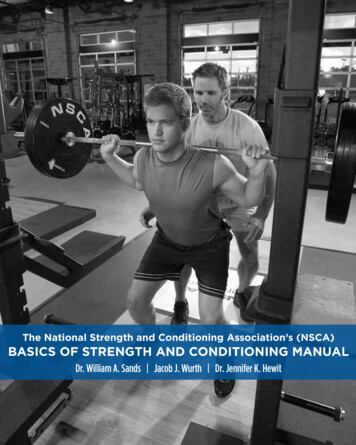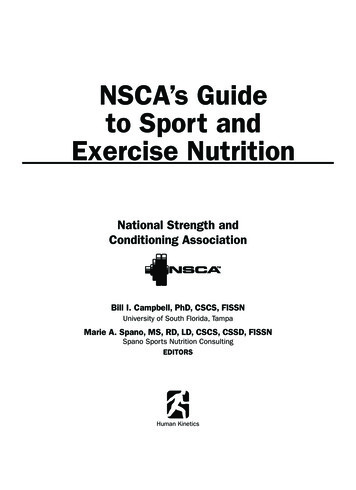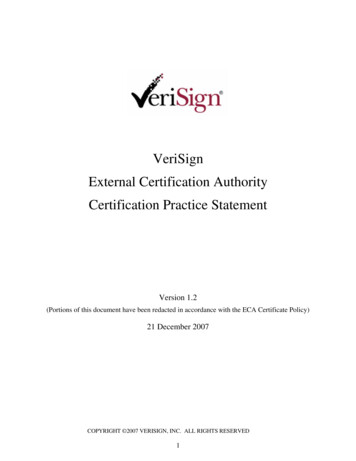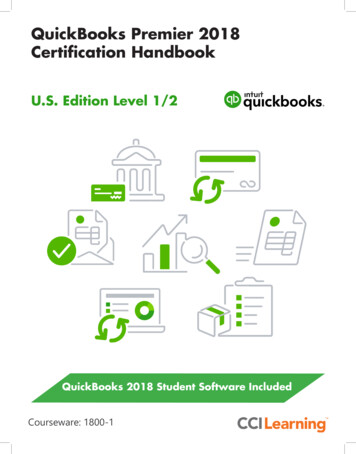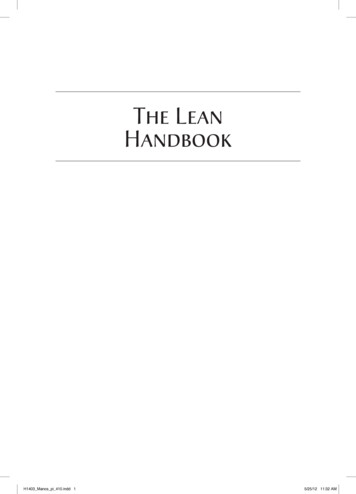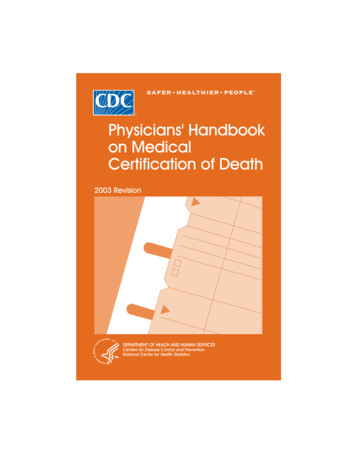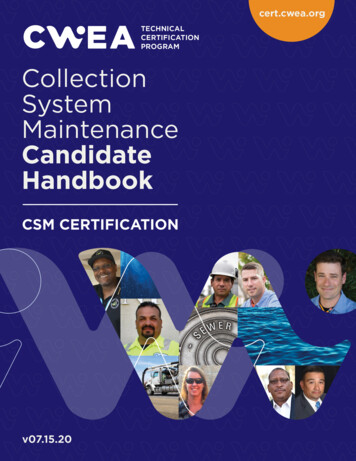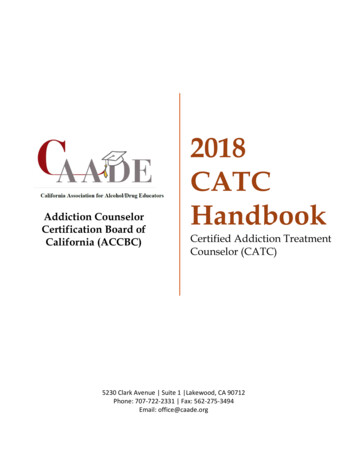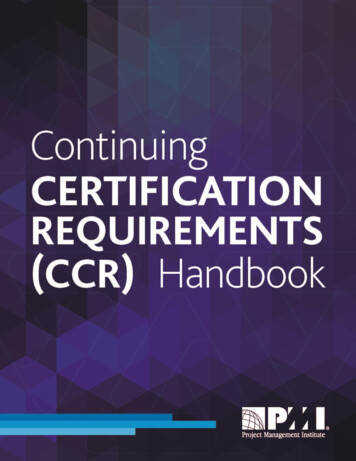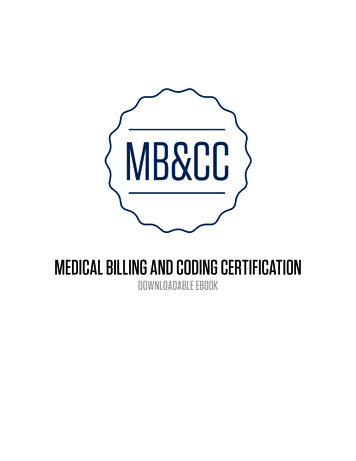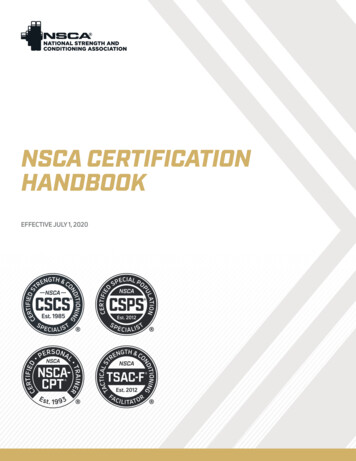
Transcription
NSCA CERTIFICATIONHANDBOOKEFFECTIVE JULY 1, 2020
NSCA CERTIFICATION HANDBOOKAbout this HandbookThis Handbook provides information needed to earn and maintain certifications offeredby the National Strength and Conditioning Association (NSCA). Individuals should reviewthe process and requirements specific to each certification, and are expected to follow thepolicies as outlined not only within the handbook but also the NSCA Code of Ethics.Statement of NondiscriminationThe NSCA does not discriminate on the basis of race, color, religion, gender, sexual orientation, gender identity or expression, national origin, age, genetic information, disability, veteranstatus, or any protected characteristic.NSCA.COMTOLL FREE 800-815-6826 // FAX 719-632-6367 // INTERNATIONAL 1-719-632-6722Copyright 2020. National Strength and Conditioning Association (NSCA). All rights reserved. No part of thispublication may be reproduced or transmitted in any form or by any means, electronic or mechanical, includingphotocopy or recording, or any information and retrieval system, without written permission from the NSCA.NSCA CERTIFICATION HANDBOOK ›› NSCA.com ›› Page ii
NSCA CERTIFICATION HANDBOOKTABLE OF CONTENTS——INTRODUCTIONApproved Exercise Science-Related Fields.7ABOUT THE ASSOCIATION. 2Acceptable CPR/AED Certifications. 7CERTIFICATIONS OFFERED. 2EXAM PREPARATION. 7Certified Strength and ConditioningSpecialist (CSCS ). 2Comprehensive Review. 7Certified Special Population Specialist (CSPS ) . 2Self-Study. 7NSCA-Certified Personal Trainer (NSCA-CPT ) . 2EXAM REGISTRATION PROCESS. 7Tactical Strength and ConditioningFacilitator (TSAC-F ). 2CompleteRegistration. 7HOW A CERTIFICATION EXAM IS CREATED. 3Special Accommodations. 8About the Exams. 3What Are Special Accommodations?. 8Job Analysis. 3How to Apply for Test Accommodations . 9Exam Development. 3Hands-on Experience. 7Affirmation. 8Standard Setting. 3Special AccommodationsDecision-Making Principles. 9Exam Content Outlines. 3Appealing a Decision. 10CSCS Exam Content. 3Submitting Eligibility Documentation . 10CSPS Exam Content. 3CPR/AED Certifications. 10NSCA-CPT Exam Content. 4Academic Transcripts (CSCS and CSPS only). 10TSAC-F Exam Content. 4Exam Fees. 10Accreditation and Registration ofNSCA certifications. 4Scheduling an Exam Appointment. 10Accreditation of Certifications . 4Exam Authorization Period.11Coalition for the Registration of ExerciseScience Professionals . 4Changes to Name or Contact Information.11The United States Registry of ExerciseProfessionals . 4HOW TO GET CERTIFIEDCERTIFICATION ELIGIBILITY. 6CSCS Requirements. 6CSPS Requirements. 6NSCA-CPT Requirements. 6TSAC-F Requirements. 6Acceptable Accreditation of Collegesand Universities. 6NSCA Recognized Programs. 6Test Center Locations.11Canceling and ReschedulingExam Appointments.11Registration Withdrawal and Refunds.11Late Arrival and No-Show.11Inclement Weather, Power Failure, or Emergency.11TAKING THE EXAM . 11Check-in Process. 11Candidate ID Requirements.11Security.12Candidate Rules Agreement and Misconduct.12Personal Belongings.12Exam Supplies.13NSCA CERTIFICATION HANDBOOK ›› NSCA.com ›› Page iii
During the Exam.13Ways to Earn CEUs .25Questions and Comments About Exam Content.13Category A Attendance . 25Breaks.13Category B Share Your Expertise . 25Leaving the Exam Early.13Category C Educational Activities . 25EXAM RESULTS.13Category D Quizzes and Assessments . 25Exam Scoring.13Where to Find CEU Opportunities . 27Exam Pass Rates.13Reporting Your CEUs . 27Confidentiality of Results.13NSCA CEUs Reported on Your Account .27Canceled Scores.13Documenting Your CEUs .27Awarding of Certification.14Random Audit .27Retake Policy.14Recertification Fee .28APPEALING EXAM RESULTS.14Late Fees .28Failure to Report and Appeals .28CERTIFICATION CHECKLIST.14Appeals .28INTERNATIONAL CANDIDATES.15Reinstatement .28PRIVACY POLICY.15Discipline Policy .28APPENDICESAPPENDIX A:SPECIAL ACCOMMODATIONS REQUEST FORM.17APPENDIX B:PRACTICAL EXPERIENCE FORM. 19APPENDIX C:REGISTRATION AFFIRMATION.20APPENDIX D:HOW TO MAINTAIN YOUR CERTIFICATION.21Your Distinguished Achievement .22An Ongoing Commitment .22Maintaining Your Certification .22APPENDIX E:EXAM DETAILED CONTENT OUTLINES .29APPENDIX F:CSCS DETAILED CONTENT OUTLINES ANDSAMPLE QUESTIONS.31APPENDIX G:CSPS DETAILED CONTENT OUTLINE ANDSAMPLE QUESTIONS.40APPENDIX H:NSCA-CPT DETAILED CONTENT OUTLINE ANDSAMPLE QUESTIONS. 47APPENDIX I:TSAC-F DETAILED CONTENT OUTLINE ANDSAMPLE QUESTIONS .52Why CPR/AED Certification is Required .22Why Continuing Education is Required .22Continuing Education Benefits .22The Recertification Cycle .22Breaking Down the CEU .23What is a CEU? .23How are CEUs Calculated? .23How Many CEUs Do I Need? .23Individuals with Multiple Certifications . 23Recertification with Distinction (*D) .24Acceptable Content for CEUs .24NSCA CERTIFICATION HANDBOOK ›› NSCA.com ›› Page iv
NSCA CERTIFICATIONHANDBOOKINTRODUCTION
ABOUT THE ASSOCIATIONFounded in 1978, The National Strength and ConditioningAssociation (NSCA) is a nonprofit association dedicated to advancing the strength and conditioning and related sport scienceprofessions around the world.The NSCA exists to empower a community of professionals tomaximize their impact through disseminating evidence-basedknowledge and its practical application by offering industry-leading certifications, research journals, career development services,networking opportunities, and continuing education. The NSCAcommunity is composed of more than 60,000 members and certified professionals, throughout the world, who further industrystandards as researchers, educators, strength and conditioningcoaches, performance and sport scientists, personal trainers,tactical professionals, and other related roles.CERTIFICATIONS OFFEREDThrough highly regarded certifications, the NSCA sets a highstandard of excellence for the industry. When you earn anNSCA certification, you elevate your credibility and join the ranksof some of the industry’s top experts. Each certification is separate and distinct with the population being served identified bythe Scope of Practice. Holding NSCA credentials demonstratesthat you are dedicated to excellence and seek to perform at thehighest level in your field.CERTIFIED STRENGTH ANDCONDITIONING SPECIALIST (CSCS )The CSCS program, created in 1985, recognizesindividuals with the knowledge and skills todesign and implement safe, effective strengthand conditioning programs for athletes in ateam setting. Certified Strength and Conditioning Specialists areprofessionals who apply scientific knowledge to train athletesfor the primary goal of improving athletic performance. Theyconduct sport-specific testing sessions, design and implementsafe and effective strength training and conditioning programs,and provide guidance on nutrition and injury prevention. Recognizing that their area of expertise is separate and distinct, CSCScertificants consult with and refer athletes to other professionalswhen appropriate.and fitness goals, and recognize and respond to emergencysituations. Recognizing their areas of expertise, CSPS professionals receive referrals from and refer clients to other healthcareproviders as appropriate.NSCA-CERTIFIED PERSONALTRAINER (NSCA-CPT )With the growth of the fitness industry, therewas a need for a prestigious and crediblepersonal training certification. In 1993, theNSCA responded with the NSCA-CPT program. NSCA-CertifiedPersonal Trainers are health and fitness professionals who usean individualized approach to assess, motivate, educate, andtrain clients regarding their health and fitness needs. Certifiedpersonal trainers design safe and effective exercise programs,guide clients in achieving their personal health and fitness goalsand respond appropriately in emergency situations. Recognizingtheir own area of expertise, NSCA-CPT certificants refer clients toother healthcare professionals when appropriate.TACTICAL STRENGTH ANDCONDITIONING FACILITATOR (TSAC-F )The TSAC-F program was established in 2012to support those who lead fitness traini
Recertification Fee . 28 Late Fees . 28 Failure to Report and Appeals . 28
